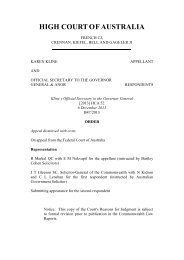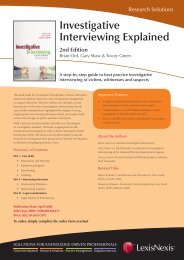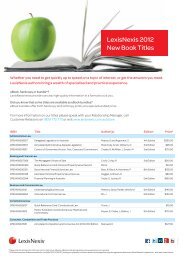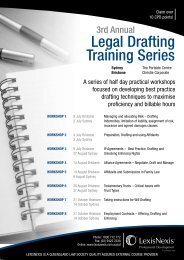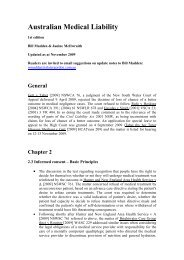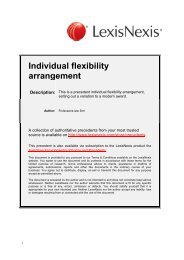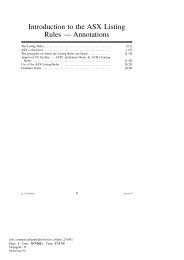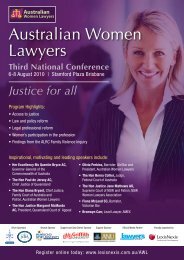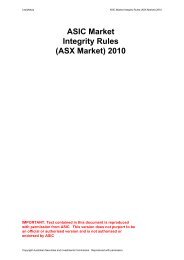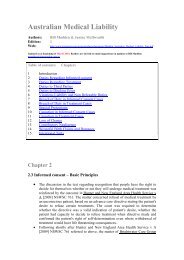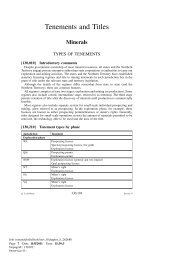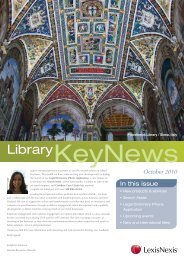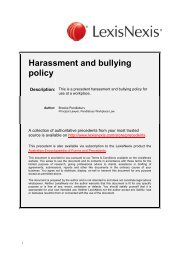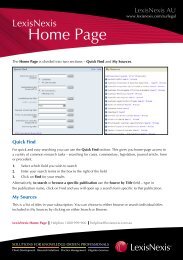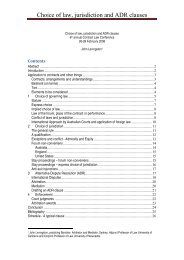Torts: Cases and Commentary - LexisNexis
Torts: Cases and Commentary - LexisNexis
Torts: Cases and Commentary - LexisNexis
Create successful ePaper yourself
Turn your PDF publications into a flip-book with our unique Google optimized e-Paper software.
2.3 Informed consent – Basic Principles<br />
The discussion in the text regarding recognition that people have the right to<br />
decide for themselves whether or not they will undergo medical treatment<br />
was reinforced by the outcome in Hunter <strong>and</strong> New Engl<strong>and</strong> Area Health<br />
Service v A [2009] NSWSC 761. The matter concerned refusal of medical<br />
treatment by an unconscious patient, based on an advance care directive<br />
stating the patient's desire to refuse certain treatments. The court was<br />
required to determine whether the directive was a valid indication of<br />
patient's desire, whether the patient had capacity to decide to refuse<br />
treatment when directive made <strong>and</strong> confirmed the patient's right of selfdetermination<br />
even where withdrawal of treatment would have life<br />
threatening consequences.<br />
Following shortly after Hunter <strong>and</strong> New Engl<strong>and</strong> Area Health Service v A<br />
[2009] NSWSC 761 referred to above, the matter of Brightwater Care Group<br />
(Inc) v Rossiter [2009] WASC 229 addressed similar issues when considering<br />
the legal obligations of a medical service provider with responsibility for the<br />
care of a mentally competent quadriplegic patient who directed the medical<br />
service provider to discontinue provision of nutrition <strong>and</strong> general hydration.<br />
The court’s reasons were consistent with the principle of patient autonomy<br />
or self-determination as to whether or not the patient will continue to<br />
receive medical treatment. See also Australian Captial Territory v JT [2009]<br />
ACTSC 105 which addressed consent to medical treatment in the context of<br />
the patient’s wishes based on a delusional set of assumptions; <strong>and</strong> H Limited<br />
v J [2010] SASC 176.<br />
Advanced Arbor Services Pty Limited v Phung [2009] NSWSC 1331 is an<br />
unusual case focusing on issues going beyond medical treatment. It is<br />
included here as it included liability for misrepresentation under the Trade<br />
Practices Act 1974 (Cth) <strong>and</strong> the Fair Trading Act 1987 (NSW).<br />
Hammond v Heath [2010] WASCA 6 considers the extent of the duty to warn,<br />
in particular regarding the removal of materials (in this case, mesh) used<br />
during the course of surgery.<br />
2.6 The court as the ultimate arbiter<br />
<br />
The discussion in the text regarding Rogers v Whitaker notes that the<br />
st<strong>and</strong>ard of care is not to be determined solely, or even primarily, by<br />
reference to the practice followed or supported by a responsible body of<br />
opinion in the profession. Marko v Falk [2008] NSWCA 293 at [76] – [79]<br />
briefly addressed the circumstances in which a court may substitute its own<br />
opinion in the following terms: ‘Mr Neil submitted that Rogers v Whitaker<br />
supported the proposition that if all members of a particular profession were<br />
doing something that was not in accordance with what the Court considered<br />
2



